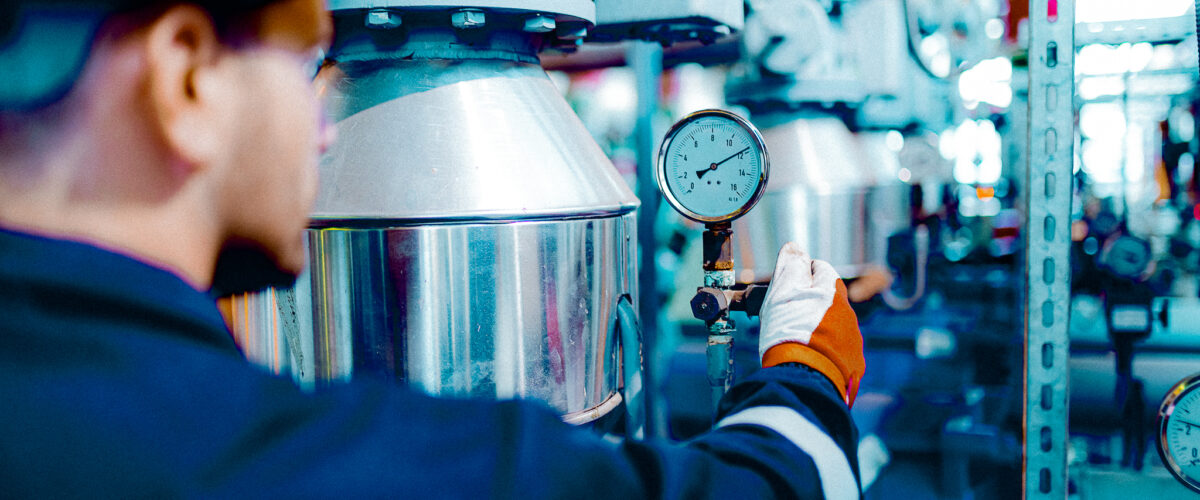Why Is Gas Detection System Maintenance Necessary (and What Happens If You Ignore It)?
When you rely on a gas detection system, you expect it to protect your people and your facility without fail. These systems are the first line of defense against leaks and exposure, but they only work if they are maintained. Skipping service may save time in the short term, but it creates risks that can lead to costly failures, compliance violations, or even serious injuries.
Gas detection maintenance is not just a box to check. It’s the difference between catching a leak before it escalates and missing the warning signs that put employees, operations, and reputations in danger.
What Does Gas Detection Maintenance Involve?
A proper maintenance program covers much more than a quick visual inspection. At Hawk, a standard service visit is built around both performance testing and compliance documentation so that your system is ready when it matters most.
- Calibration and bump testing verify that sensors respond accurately to target gases. Hawk recommends annual calibration at a minimum, though many facilities benefit from six-month intervals, and high-risk areas may require quarterly checks.
- Sensor element replacement is factored in during service cycles. Electrochemical sensors often need replacement every 2–5 years depending on the gas. Infrared sensors can last closer to 10 years. Transmitters and control panels, when maintained, often run 15–20 years.
- Firmware and software updates keep systems current with evolving codes, fix bugs, and improve reliability.
- Detailed inspections of alarms, relays, and wiring confirm that when gas is detected, the fans, strobes, or shutdowns tied to your system activate correctly.
- Full documentation is produced after every visit, including calibration gas lot numbers, expiration dates, images, alarm verification, and signatures.
This level of service ensures detectors stay reliable, inspectors have the records they expect, and facilities can prove compliance at any time.
How Maintenance Frequency Is Determined
Not every facility needs the same gas detector service schedule. Hawk tailors maintenance plans based on:
- Type of gas and sensor – Some gases degrade sensors faster than others, and certain sensor chemistries require more frequent checks.
- Environmental exposure – A sensor that frequently encounters target gas or harsh conditions will drift faster than one in a clean, low-use environment.
- Alarm levels and sensitivity – Facilities that require very low detection thresholds for safety or code reasons must keep sensors finely tuned.
- Occupancy patterns – A continuously staffed lab may require stricter maintenance than a storage room only entered occasionally.
By balancing these factors, Hawk sets a service schedule that keeps systems compliant and cost-effective, without over- or under-servicing.
The Real Costs of Avoiding Gas Detection Maintenance
Neglecting service often creates hidden costs that far exceed the price of routine upkeep.
- Sensor drift and false alarms waste productivity, trigger unnecessary evacuations, and reduce trust in the system.
- Missed leaks put employees at risk and open the door to lawsuits, workers’ compensation claims, or regulatory fines.
- Compliance failures are common when calibration records are missing. Inspectors may order a shutdown until proper documentation is provided.
- Premature sensor failure adds thousands in replacement costs. An electrochemical sensor designed to last five years may fail in two if left uncalibrated.
- Emergency service calls cost more than scheduled visits. While some calls are under $1,000, complex jobs involving dozens of sensors, lifts, cleanrooms, or security clearance can push costs toward $10,000.
These problems are avoidable with a consistent gas detector system upkeep program.
Why Maintenance Matters for Compliance and Warranty
Regulators and manufacturers both require proof that your system is serviced. OSHA, NFPA, and local code authorities frequently request calibration logs that include:
- Sensor serial numbers
- Calibration gas bottle lot numbers and expiration dates
- Images of tested sensors
- Alarm verification results
- Technician notes and signatures
- Next due calibration dates
- Expected sensor element replacement dates
- Labels affixed to each sensor confirming service
Without these records, fines and liability increase significantly. Manufacturers also expect maintenance documentation to back warranty claims. If proof is missing, warranties are often voided, leaving facilities to cover repair or replacement costs in full.
Maintenance records also serve as a critical risk management tool. They show employees, auditors, and insurers that the system is actively managed and that the facility takes safety accountability seriously.
How Preventive Gas Detection Maintenance Saves Time & Money
Proactive service reduces risk, but it also pays for itself in long-term cost savings.
- Consistent calibration schedules keep large or multi-site facilities on track, no matter how many detectors are deployed.
- Extended lifespan is achievable when sensors, transmitters, and panels are checked and adjusted regularly. Infrared sensors often reach the full 10 years of service, while transmitters and panels regularly exceed 15 years.
- Reduced emergency service calls free up budgets and minimize operational disruptions.
- Lower liability by ensuring inspectors find complete, up-to-date records.
- Efficiency for internal teams since Hawk’s specialists handle the details and keep the compliance paperwork ready for audit.
In many cases, Hawk’s technicians discover hidden problems that prevent much larger costs. A common scenario is when an old system is replaced and calibrated correctly for the first time in years. Small leaks are identified immediately, corrected before they escalate, and recorded for compliance purposes.
Common Mistakes When Maintenance Is Ignored
Facilities that skip or cut corners on maintenance often encounter the same problems:
- Unnecessary evacuations due to nuisance alarms that damage trust in the system.
- System silence during real events where alarms should trigger but do not, leading to dangerous exposures.
- Code enforcement shutdowns when inspectors find missing records or uncalibrated sensors.
These failures are entirely preventable with a gas detector service schedule managed by experienced technicians.
Hawk’s Differentiation
Cheaper service providers often try to fold gas detection into a wider set of mechanical or electrical services. The result is technicians who dabble in gas detection but lack the tools and depth of experience.
Hawk takes a different approach:
- Our technicians focus solely on gas detection systems, so they are faster, more accurate, and more experienced in troubleshooting.
- We maintain the specialty tools and adaptors required for all brands, so no matter what mix of detectors a facility has, Hawk can handle them.
- Our team has seen nearly every failure mode, which means we make preventative adjustments to stop problems before they cause downtime.
This focus allows Hawk to provide better long-term outcomes for facilities, even when initial service costs may appear higher than low-bid competitors.
FAQs
What happens if I skip routine service?
Alarms may fail during a real leak, or they may trigger constantly without cause. Either way, facilities risk downtime, fines, lawsuits, and costly emergency repairs.
How often should maintenance be performed?
Most facilities should calibrate at least annually. Many benefit from six-month cycles, and some high-risk operations require quarterly checks. Hawk evaluates gas type, environment, alarm levels, and occupancy to set the right schedule.
Does maintenance affect warranty or compliance?
Yes. Skipping service almost always voids manufacturer warranties and creates compliance gaps. Calibration reports and labels are required by regulators and inspectors.
Schedule Your Gas Detection Maintenance Today
Gas detection maintenance is not optional if you want reliable protection, compliance confidence, and long-term cost savings. Ignoring it accelerates system failures, increases liability, and risks employee safety.
Hawk Equipment Services specializes in gas detection maintenance. Our technicians work on all brands, bring the right tools to every job, and know how to identify problems before they escalate. We provide complete calibration logs, inspection records, and compliance documentation for every visit.
Contact Hawk today to schedule your next maintenance check or set up a proactive service plan that protects your people, your property, and your bottom line.

